Star Trek is an iconic cornerstone in the realm of pop culture, spanning its influence far and wide like a Federation starship exploring the galaxy. Originating back in the mid-1960s, this mind-bending science fiction epic has metamorphosed through the creative energies of multiple directors, producers, and ever-changing casts. Yet, astonishingly, its core values of exploration, unity, and moral complexity have steadfastly remained the same, capturing the imaginations and loyalties of a diverse, global fan base. Now, given this sprawling archive of TV shows, movies, and even animated series, it's utterly understandable that some might find the chronology a little, well, daunting. You'd be forgiven for feeling like you're navigating a temporal wormhole without a star chart. But fear not! We've got your back with a meticulously curated list designed to offer you a practical starting point for jumping into the labyrinthine world that is Star Trek. And just a quick heads-up: there's no universally agreed-upon 'right way' to consume Star Trek's extensive repertoire. It boils down to personal taste and what you want to get out of this incredible universe. Some may first opt for the original series to get the classic experience, while others might prefer a more modern approach with newer installments. In any case, you're in for a journey that promises to take you where perhaps you've never gone before.
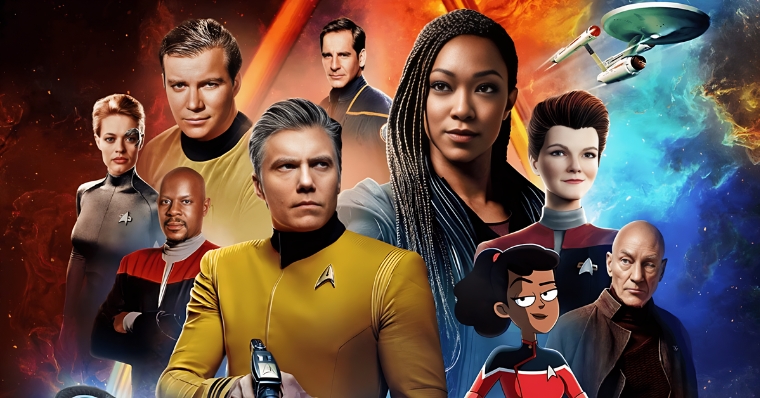
Star Trek in Chronological Order
or the uninitiated, diving into the cosmic realm of Star Trek might feel like setting a course for the Delta Quadrant without a map. But if you're up for a chronological trek—no pun intended—the Star Trek universe basically kicked off in 1964 with an unaired pilot called "The Cage." It featured some of the earliest voyages of Captain Pike and First Officer Spock, immortalized by Leonard Nimoy, aboard the pop culture behemoth of a spaceship, the USS Enterprise. Penned by the franchise's architect, Gene Roddenberry, "The Cage" was promptly snubbed by NBC. The network felt it was a tad "too intellectual" for the era's sensibilities, especially given that most early 1960s science fiction was aimed at a younger crowd. The series underwent a facelift after some corporate wrangling between Roddenberry and NBC. Enter the dashing Captain Kirk, brought to life by William Shatner. The newly revamped Star Trek premiered in 1966, thrusting us into a tale of galactic diplomacy, exploration, and, yes, some battles with aliens that, let's admit, had quite the range of prosthetic foreheads. The initial series had a cavalcade of now-iconic characters, including Nimoy reprising his role as Spock, Nichelle Nichols as Uhura, DeForest Kelley as Dr. McCoy, George Takei as Sulu, James Doohan as Scotty, and Walter Koenig as Chekov. Even though their televised journey lasted a mere three seasons, the crew's impact has rippled through time and space, inspiring a plethora of sequels, prequels, and even a parallel universe or two in Star Trek's media pantheon. Not to be overlooked, the original series was a groundbreaker in terms of social and political context. A diverse cast featuring white, Black, Russian, and Japanese characters shared the screen for the first time in American mainstream television. Additionally, it marked the inaugural interracial kiss on American television between Captain Kirk and Lieutenant Uhura. As the years warped by, Star Trek productions kicked into hyperdrive, with the original series becoming just a fraction of a complex, expansive timeline. Given all this, we've assembled a comprehensive list of Star Trek installments, carefully sorted by in-universe chronology, to guide you on your journey through this intricate mosaic of storytelling. There's no need to fumble around like a cadet on their first away mission; we've got you covered.
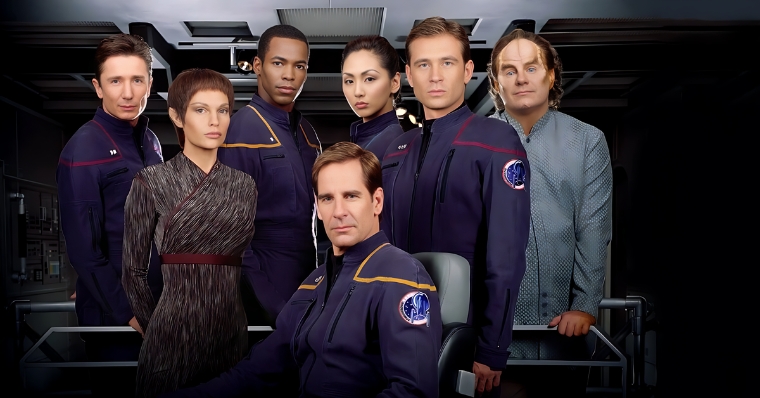
1 - Star Trek: Enterprise (TV Series)
- Timeline: 2151-2155
- Air Dates: 2001 – 2005
- Number of Seasons: 4
- Streaming Platforms: Paramount+
If you're itching to kick things off from the beginning—historically speaking, of course—then "Star Trek: Enterprise" is where your journey should begin. What sets this series apart is its laser focus on the roots, the nuts and bolts, of what would later become the monumental Federation of United Planets. You'll find yourself at the genesis of Starfleet, the elite spacefaring military service, and be introduced to many other key components that lay the foundation for the entire "Star Trek" universe. This series gives you a front-row seat to pivotal moments and delves into the geopolitical intricacies of forming an alliance of various star systems and planets. You'll witness the struggles and successes as humanity and its extraterrestrial allies work toward a shared future. With four seasons at your disposal, it offers a substantial storyline that adds critical context and weight to everything that comes afterward in the franchise.
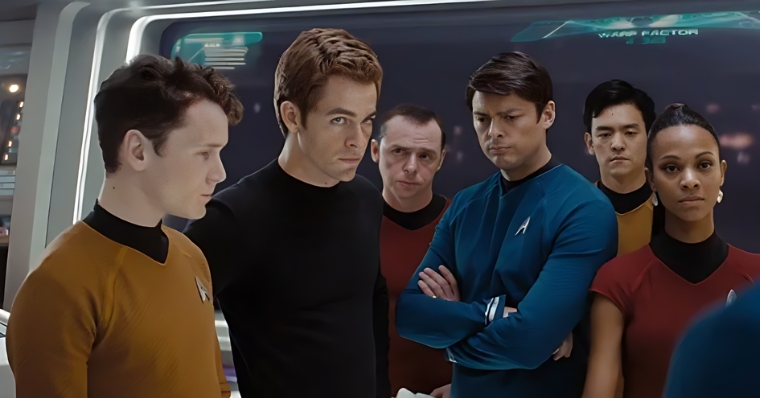
2 - Star Trek (Film)
- Timeline: 2255
- Release Date: 2009
- Where to Watch: Paramount+, Amazon Prime
The last trilogy of produced films in this iconic franchise starts with this gem of a movie, rejuvenating the Star Trek universe while still tethering itself firmly to its original timeline. Directed by J.J. Abrams, this cinematic venture came as a breath of fresh air after Star Trek's seven-year hiatus from the big screen. The flick didn't just tiptoe back into theaters; it burst through the celluloid, skyrocketing itself into the franchise's best-of lists. So what's the deal with this movie, you ask? We're back with the USS Enterprise crew, but there's a twist. It's a fresh-faced cast stepping into the iconic roles. Chris Pine takes on the mantle of Captain Kirk, with Zachary Quinto as Spock, Karl Urban embodying McCoy, Zoë Saldaña as Uhura, John Cho portraying Sulu, Simon Pegg as Scott, and Anton Yelchin filling the shoes of Chekov. The narrative masterfully introduces us to this new yet familiar crew, weaving their individual stories into a cohesive unit. Nero, a villain who's dropped in from another timeline like a cosmic party crasher, threatens to wipe Earth off the star map. Intricate. If you're the type to appreciate intricacies in storytelling, this reboot has your name written all over it. But let's pump the brakes for a second and talk about fan service. Not the cheap kind, but the kind that warms your sci-fi-loving heart. Leonard Nimoy returns to grace us with his portrayal of Spock. It's like hearing a classic rock song in the middle of today's Top 40 hits. It fits, and it's glorious. Witnessing Nimoy's Spock interact in a universe reinvigorated by new talent is a surreal collision of Star Trek generations. It's an acknowledgment that while things change, the essence, the soul of Star Trek, remains a constant.
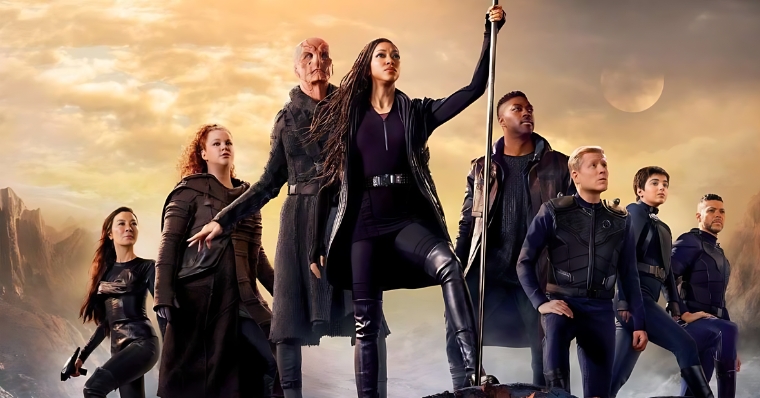
3 - Star Trek: Discovery (TV Series)
- Timeline: 2256-2258 (Seasons 1 and 2)
- Timeline: 3188-TBD (Seasons 3 and 4)
- Air Dates: 2017 – 2022
- Number of Seasons: 4
- Streaming Platforms: Paramount+, DIRECTV
A relative newcomer to the grand tapestry that is the "Star Trek" universe, "Star Trek: Discovery" swoops in to continue the storytelling that "Star Trek: Enterprise" set in motion. The series thrusts viewers into the heat of the Federation's conflict with the Klingon Empire—an empire filled with hardened warriors who've been a constant thread throughout the "Star Trek" tapestry. This series doesn't skimp on characters who add rich new layers of understanding to the franchise's world, from key Federation members to enigmatic Klingon leaders. While the first two seasons stay somewhat anchored to the original timeline, the third and fourth seasons jump the shark—or rather, the space-time continuum—all the way to the year 3188 and beyond. This kind of narrative shift turns the series into a time-traveling odyssey that explores the Federation's future. Consequently, if you want to neatly plug this series into the overarching "Star Trek" timeline, your best bet would be to queue it up after navigating through the films featuring the "Star Trek: The Next Generation" cast. What makes "Star Trek: Discovery" a compelling watch is its ability to juggle past, present, and future story arcs while offering fresh takes on established "Star Trek" lore. Whether delving into complex diplomatic negotiations or showcasing adrenaline-pumping space battles, this series offers a well-rounded experience crucial for anyone looking to fully grasp the scope of the "Star Trek" universe.
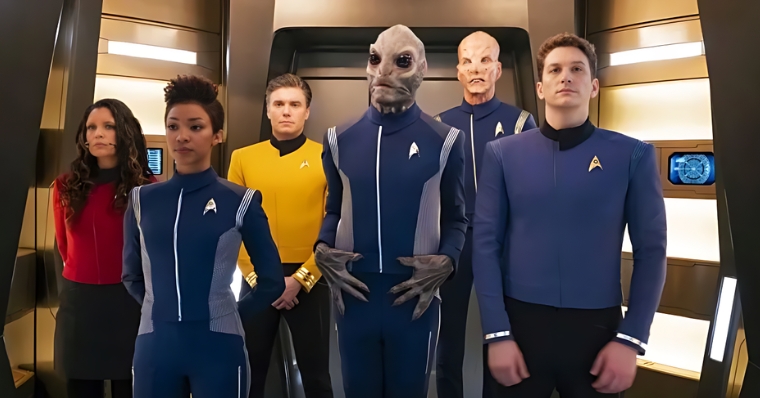
4 - Star Trek: Short Treks
- Timeline: 2256-2258
- Air Dates: 2018-2019
- Number of Seasons: 2
- Streaming Platforms: Paramount+
Navigating the Star Trek universe often feels like an intricate dance between starships, time loops, and multiple dimensions. Among these multilayered stories is a mini-anthology series that graced our screens between 2018 and 2019: "Star Trek: Short Treks." These bite-sized narratives serve as an appetizer, sometimes an amuse-bouche, for Trekkies seeking more content but with less commitment. We're talking about 15- to 20-minute episodes that shift focus from Starfleet personnel to outsiders, revealing poignant moments, untold backstories, and whimsical scenarios that defy time and space. Far from mere filler or fan service, "Short Treks" offers a platform for storytelling experimentation. The series delves into a mosaic of themes, from ethical paradoxes to emotional intimacy, while maintaining that classic Star Trek intellectual curiosity. Directors like Olatunde Osunsanmi and writers like Michael Chabon contribute their distinct flavors to this cosmic blend. The result? An array of mini-adventures that enhance, challenge, and sometimes playfully subvert Star Trek canon. If you're keen to dig deeper into the Federation's expansive tapestry but are strapped for time, "Short Treks" is an astute starting point.
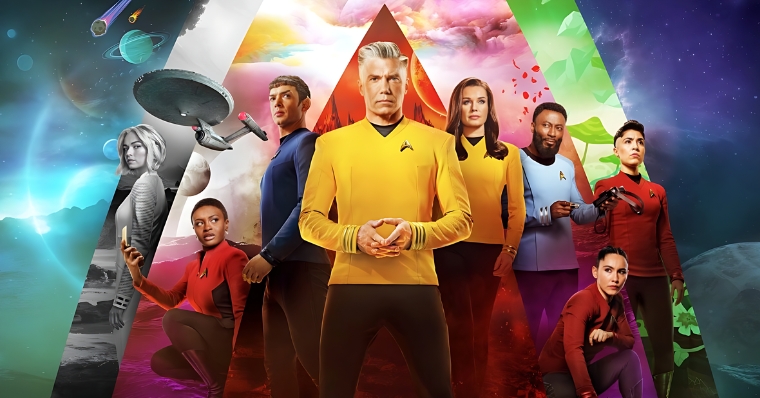
5 - Star Trek: Strange New Worlds (TV Series)
- Timeline: 2259-TBD
- Air Dates: 2022 – 2023
- Number of Seasons: 2
- Streaming Platforms: Paramount+
"Star Trek: Strange New Worlds" has rapidly become a fan-favorite by shining a spotlight on Captain Pike, brought to life by Anson Mount. If you ever wondered what the USS Enterprise was up to before the 1960s canceled pilot thrust it into popular culture, this is your series. Set on board the illustriously iconic starship, this offering from the franchise stitches together episodes that seamlessly fit into the universe's lore, but just a smidgen before that unaired pilot everyone keeps talking about. For long-time fans, this is a window into an era that hasn't been extensively covered yet. For newbies, it's an entry point that's not overwhelmingly steeped in lore. Either way, this show beckons with the promise of exploration, new civilizations, and those timeless 'boldly go' vibes.
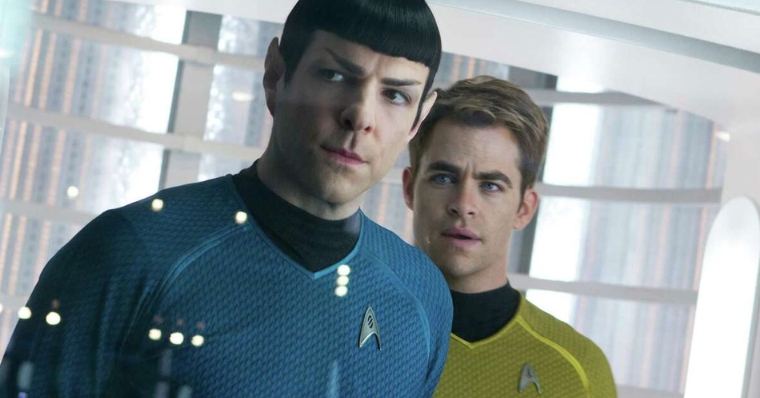
6 - Star Trek: Into Darkness (Film)
- Timeline: 2259
- Release Date: 2013
- Where to Watch: Paramount+, Amazon Prime
If you thought the "Star Trek" universe had hit its stride with the 2009 reboot, wait until you get a load of its sequel, "Star Trek: Into Darkness." Once again helmed by J.J. Abrams, this space-faring sequel takes our new but familiar USS Enterprise crew and dunks them into a pressure cooker of high stakes and even higher tensions. What's the buzz this time? Enter Khan, but not as you might recall him from the classic '60s series. This time, Khan has been reimagined and is portrayed by none other than Benedict Cumberbatch—yup, Sherlock's gone rogue in space! He ups the ante, posing a severe threat to the Federation and giving our beloved Enterprise crew some severe headaches. But this isn't just a shoot-'em-up space escapade. This film is an earnest tribute to the original '60s Star Trek series. It deftly combines gut-punching action scenes with visually breathtaking special effects, making it evident that the production crew went above and beyond to ensure this movie stands toe-to-toe with its lauded predecessor. Trust us, the adrenaline-charged sequences aren't just there to quicken your pulse; they're finely crafted, fitting naturally into a well-paced narrative. And let's not forget the visual effects. If the first film in the reboot series was a visual treat, then "Into Darkness" is an all-out feast for the eyes. From the intricate design of the starships to the awe-inspiring expanses of deep space, each frame feels like a vibrant work of art. The film sets a high bar, not just keeping up with the cinematic quality established by its forerunner but arguably surpassing it. Have you ever listened to a song's remix and thought, "This adds something spicy to the original?" That's exactly what's happening here. It maintains the franchise's essence and respects its past but adds layers of complexity, emotion, and jaw-dropping action. It's a riveting watch that adds new dimensions to familiar characters and lays the groundwork for future adventures—just like a sequel should.
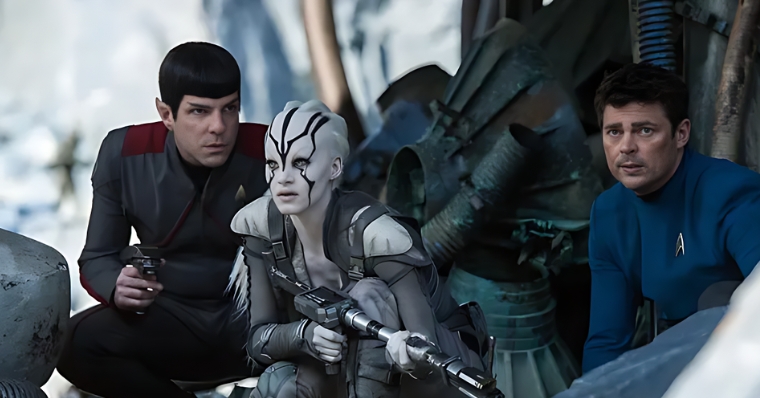
7 - Star Trek: Beyond (Film)
- Timeline: 2263
- Release Date: 2016
- Where to Watch: Amazon Prime
And now we come to the grand finale of the Star Trek film reboot series: "Star Trek: Beyond." By the time you arrive at this installment, you'll have been through a lot with this new Enterprise crew—time jumps, villainous revivals, you name it. Now, brace yourself for a film that ramps up the tension while staying true to the franchise's core principles of exploration, unity, and, of course, snappy one-liners. In this flick, the crew of the USS Enterprise, that familiar interstellar ride, finds themselves in a heck of a situation. Their newest nemesis is Krall, a vengeful military leader with a vendetta against the Federation. With his relentless assault on the Enterprise, our heroes don't just face external threats but also internal struggles, especially after a crash landing puts them in even tighter straits. But this is no ordinary 'aliens attack, heroes defend' saga. What follows is a scramble against time, alien technology, and unfamiliar terrains. The team must pull out all the stops to prevent a hostile alien race from initiating what could very well become an all-out galactic war. The stakes? Let's just say they're cosmic. Let's talk about Krall for a moment, shall we? He's not your everyday bad guy. In a universe filled with memorable villains, Krall offers a fresh angle—a leader who views the Federation's unity as its ultimate weakness. And that perspective challenges not just the crew but also the very ideals the Federation stands for. It's compelling stuff. The brilliance of this movie lies not only in its action sequences—which, trust me, will leave your heart pounding—but also in its intricate storyline and well-sketched characters. It's the perfect playground for dilemmas of duty, friendship, and survival to unfold. Even the usually stoic Spock, played by Zachary Quinto, experiences an internal war between logic and emotion. These nuances elevate "Beyond" from being just another action-packed sci-fi film to a layered narrative offering food for thought. While we're on the subject of action, don't overlook the film's exceptional set pieces. Every action scene is a visual delight, from thrilling space battles to hand-to-hand combats on unknown planets. This isn't just a mere spectacle for its own sake; each set piece works seamlessly to advance the storyline and deepen the emotional arcs of our characters.

8 - Star Trek: The Original Series (TV Series)
- Timeline: 2265-2269
- Air Dates: 1966 – 1969
- Number of Seasons: 3
- Streaming Platforms: Paramount+, Pluto TV
Ah, here we are—ground zero for Trekkies! "Star Trek: The Original Series" isn't just a franchise hallmark; it's basically the beating heart of the entire Star Trek universe. T his is where the USS Enterprise first blazed across TV screens, making household names out of Captain Kirk, Spock, and the indomitable crew that navigated their way through the cosmos like rockstars in a galactic world tour. Their mission: to boldly deal with high-stakes challenges and jaw-dropping threats, the likes of which audiences in the 1960s had never seen before. Why do many die-hard fans consider this to be the pièce de résistance of the franchise? Well, it's not just about the nostalgic allure of retro-futuristic sets or the groundbreaking special effects (for their time, mind you). What really sets this series apart is its uncanny ability to serve up deeply engaging and intellectually stimulating narratives in each episode. The storylines? Superb. The dialogue? Utterly captivating. The sense of adventure? Off-the-charts enjoyable. This show wasn't just about lasers and aliens; it was a master class in exploring profound themes under the guise of fun and exploration. If you were to think of the Star Trek franchise as a sprawling, interstellar orchestra, then "The Original Series" would be the first violinist—leading the way but always in perfect harmony with the rest. It didn't just set the tone for future series and movies; it basically wrote the rulebook for what science fiction could and should be. And if you think that rulebook is gathering dust, think again. The series' DNA is so prevalent it has been dissected, analyzed, and emulated in countless other series, films, and, yes, even comics like "Star Trek: Year Five." Tuning into this legendary series is like taking a walk down a sci-fi memory lane, where every episode is a pit stop at something thought-provoking or extraordinarily entertaining. It would be downright illogical not to allocate some quality time to this timeless masterpiece. It's a journey through the final frontier that still feels as fresh and relevant today as it did over half a century ago.
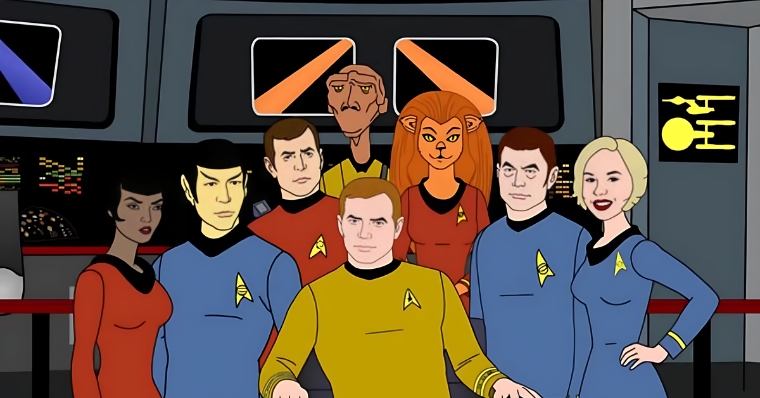
9 - Star Trek: The Animated Series (TV Series)
- Timeline: 2269-2270
- Air Dates: 1973 – 1974
- Number of Seasons: 2
- Streaming Platforms: Paramount+
"Star Trek: The Animated Series" is a sequel in animated form, picking up where the original series left off. But before you go thinking it's just a watered-down version designed for Saturday morning cereal sessions, take note: the original ensemble from the '60s returned to voice their iconic roles. We're talking about the A-list crew here—Kirk, Spock, Dr. McCoy, Uhura, Scotty, Sulu, and Chekov. It's like the universe pressed pause, switched formats, and then hit play again. Since each episode runs for about 20 to 25 minutes, the creators crammed a lot of narrative firepower into those tight timeframes. They crafted story arcs that presented the USS Enterprise crew facing new challenges and going on wild adventures, all while keeping the show accessible to younger viewers. It's like they distilled the essence of the original show into bite-sized episodes. And yes, the objective was clear: hook a new generation on the allure of interstellar travel and ethical paradoxes. Now, there's another layer to why this series is intriguing. It offered fans a rare chance to see Star Trek characters in less-than-life-size. While the animation might not be Pixar-level, the series captures the spirit of the original and then adds a playful spin. For true enthusiasts, there are even some comics like "Star Trek: The Animated Series - The Official Comics Adaptation" that offer more depth to these animated tales.
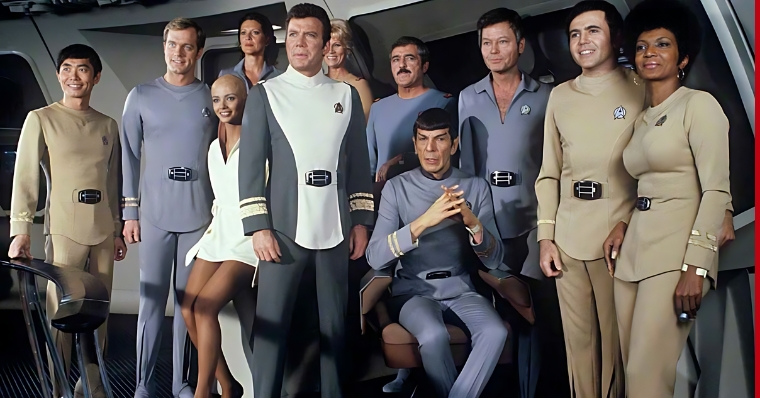
10 - Star Trek: The Motion Picture (Film)
- Timeline: 2270s
- Release Date: 1979
- Where to Watch: Paramount+
Before you space cowboys start comparing it to other sci-fi hits, know this: "Star Trek: The Motion Picture" isn't just another movie in the Star Trek arsenal—it's the OG of Trek films. And here's the scoop. In the wake of Star Wars creating an interstellar splash at the box office, Gene Roddenberry found himself powwowing with Paramount execs, brainstorming on how to shoot the Star Trek franchise into a whole new galaxy of entertainment. He initially considered resurrecting the original series for another season and even had a pilot script locked and loaded. But alas, that plan went through some cosmic turbulence, and the result was transforming the pilot episode into a full-blown feature film. Fast forward to 1979, and "Star Trek: The Motion Picture" was beamed into theaters with all the grandiosity of an intergalactic diplomatic event. The original cast was back, albeit with a few more wrinkles and strands of gray, united once more to confront a cosmic anomaly on a voracious path of destruction. We're talking edge-of-your-seat, what's-going-to-happen-next levels of anticipation here. The premise might sound familiar to ardent fans, as it plays upon themes from episodes of the original series—only now, it's supercharged with cinematic flair. But hold onto your phasers. While the film prides itself on its intellectual prowess, its pacing takes a bit of a leisurely tour of the cosmos. Intentionally drawing inspiration from Stanley Kubrick's cerebral "2001: A Space Odyssey," the movie wasn't a hit with every critic or lifelong Trekkie out there. Some found the slow burn a bit too languid for their hyperspeed tastes.
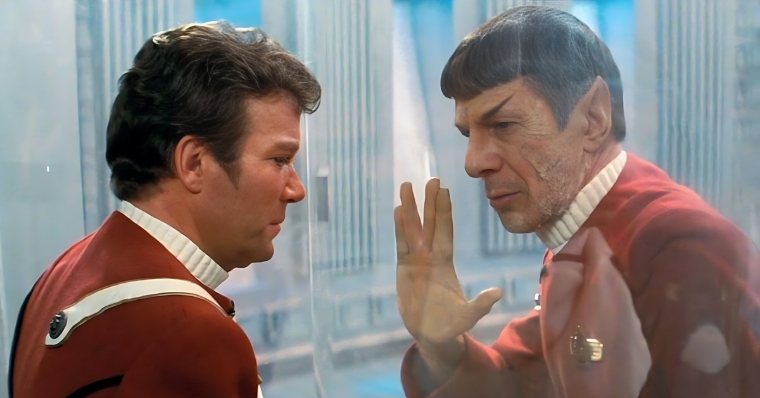
11 - Star Trek II: The Wrath of Khan (Film)
- Timeline: 2285
- Release Date: 1982
- Where to Watch: Paramount+
Look no further if you're hunting for the creme de la creme of the Star Trek cinematic universe. "Star Trek II: The Wrath of Khan" rolled out in 1982, just a few years after the franchise's film debut, and it didn't just keep the spaceship afloat—it shot it into hyperdrive. Arguably crowned as the pinnacle of Star Trek movies, this sequel doesn't just meander through space; it has a mission. The film marks the glorious reappearance of Khan, that arch-nemesis of the USS Enterprise crew who gave a whole new meaning to the term 'bad blood.' The role, reprised by the charismatic Ricardo Montalbán, epitomizes villainy with a certain theatrical flair. But this isn't just a cosmic cat-and-mouse game; there's an object of fascination here—the Genesis Device. Picture a game-changing gadget that could solve overpopulation and food scarcity across the United Federation of Planets. A utopian dream, really. But in the wrong hands? It's apocalyptic nightmare fuel. This moral tightrope adds layers of intensity to the narrative. On the one hand, the Genesis Device is this super-gizmo that could redefine life as the Federation knows it. On the other hand, Khan wants to flip that script and turn this technological
Marvel into an instrument of mass destruction. So, as you can imagine, the stakes are planetary, nay, galactic! Unlike its predecessor, which took its sweet time weaving through space and time, "The Wrath of Khan" is gripping, dramatic, and tinged with emotional complexities that challenge the characters and the audience. The film makes you contemplate the ethical boundaries of science, the irrevocable nature of choices, and the depths of friendship and sacrifice. It's a lot more than just phasers and space battles, though. Don't get me wrong, it's got that too.
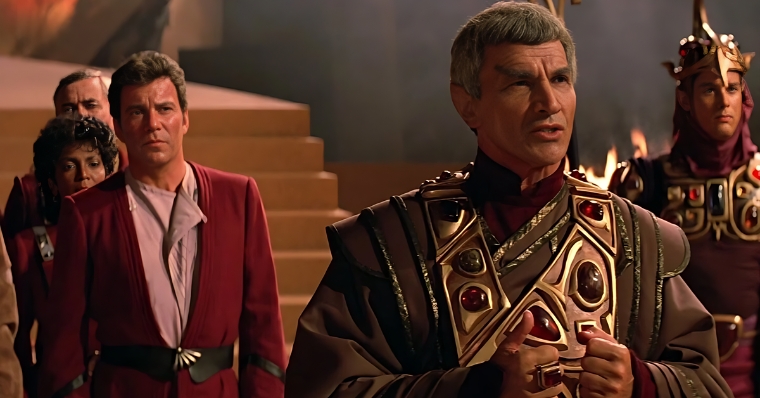
12 - Star Trek III: The Search for Spock (Film)
- Timeline: 2285
- Release Date: 1984
- Where to Watch: Paramount+
If you're in the mood to deep-dive into the emotional universe of Star Trek, the third installment serves it on a galactic platter. "Star Trek III: The Search for Spock" highlights Captain Kirk grappling with a reality almost too harsh to bear: the death of his First Officer and bosom buddy, Spock. It's not just spaceships and cosmic battles here; we're talking about profound grief, people. In a brilliant move, the film uses this devastating loss to venture deeper into Vulcan culture—the otherworldly roots of the dearly departed Spock. Suppose you ever wondered about the traditions, rituals, and unique quirks that define Spock's people. In that case, this movie is pretty much a Vulcanology 101 course, albeit wrapped in emotional drama and sci-fi spectacle. Now, the director's chair for this one had a familiar face—or should we say a familiar Vulcan? Leonard Nimoy, the very actor who portrayed Spock, stepped up to the directorial plate for the first time on the cinematic stage. While he had directed some episodes of the classic TV series, commandeering a feature film presented a whole new universe of challenges and opportunities. It added an unparalleled personal touch to the movie as if Nimoy himself were guiding us through Spock's spiritual homeland. However, let's not sugarcoat it: the film didn't skyrocket in the eyes of the critics or the fan base. It felt like a more subdued, contemplative relative when compared to its high-octane predecessor, "Star Trek II: The Wrath of Khan." Though intellectually engaging, the narrative's deliberate focus on emotional intricacies and Vulcan rituals wasn't everyone's cup of Earl Grey tea. Consequently, if you'll pardon the irony, its reception was lukewarm, considering we're talking about a movie partly set on a planet of volcanoes.
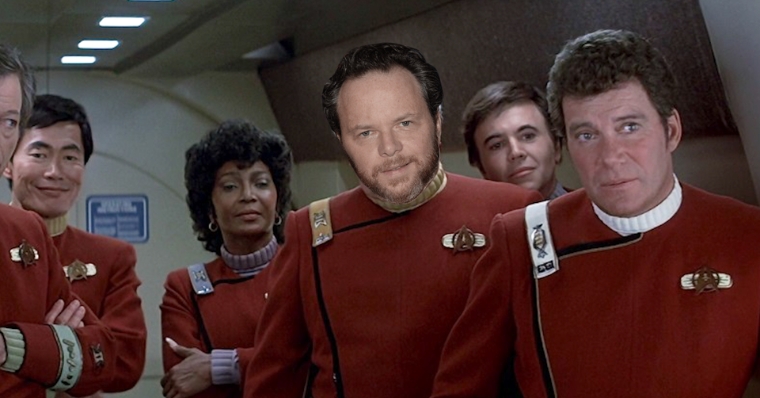
13 - Star Trek IV: The Voyage Home (Film)
- Timeline: 2286 and 1986
- Release Date: 1986
- Where to Watch: Paramount+
If you're craving something in the Star Trek universe that strikes a balance between high stakes and high laughs, then you've got to put "Star Trek IV: The Voyage Home" on your watchlist. Leonard Nimoy, the man himself, directed this time-hopping adventure and penned the script. In this fourth cinematic escapade, the OG crew of the USS Enterprise—Kirk, Spock, Dr. McCoy, Uhura, Scotty, Sulu, and Chekov—embark on a mission so outlandish, it's like the '60s series and '80s sensibilities had a lovechild. They zoom back in time to the Earth of the 1980s. And what's the mission? Hold onto your phasers: they need to rescue a humpback whale. Not just for kicks but to respond to a mysterious, planet-destroying probe that apparently only speaks "Whale." It's not just an oddball adventure; it's also an eco-conscious narrative emphasizing the significance of species preservation. Think about it; this film was addressing climate change and extinction issues long before they became the dinner-table debates they are today. Nimoy and the crew were subtly teaching us that the final frontier isn't just space but also our responsibilities to Mother Earth and her creatures. What sets this installment apart from others is its playful tone that sometimes tiptoes into outright comedy. Imagine the Enterprise crew navigating the baffling world of 1980s Earth: the fashion, the tech, the music. It's fish—or should we say whales—out of water in the most entertaining way possible. And there's an unexpected benefit to all the laughs and quirkiness: you end up feeling an even stronger bond with the crew. Their camaraderie shines through every hilarious misunderstanding and every poignant moment. If you're one of those fans who treasure the friendships among the Enterprise gang as much as their adventures, this one will feel like a cozy get-together, albeit one that spans both time and space.
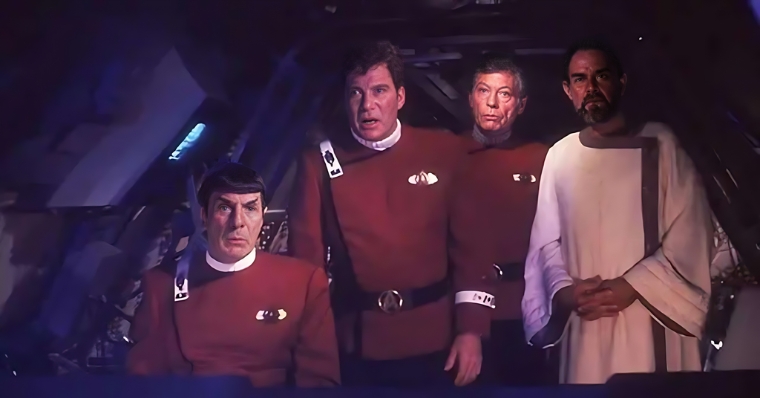
14 - Star Trek V: The Final Frontier (Film)
- Timeline: 2287
- Release Date: 1989
- Where to Watch: Paramount+
Not every Star Trek film will be a diamond, and "Star Trek V: The Final Frontier" proves that point. After the smashing success of the previous installment, the producers thought they'd caught lightning in a bottle by having actors from the series direct the films. So, they handed the reins to William Shatner, the iconic Captain Kirk himself. While this might've seemed like a match made in Trekkie heaven, let's just say the outcome didn't quite soar to the celestial heights of its ambition. The word on the cosmic street is that the original script concept was actually solid gold. But alas, a writer's strike that was happening at the time threw a photon torpedo into the mix. Because of this labor unrest, the script got watered down like a weak Romulan ale, affecting the film's overall quality. So, what's the actual premise? The USS Enterprise crew goes head-to-head with Sybok, a Vulcan gone rogue. And Sybok's mission isn't your run-of-the-mill megalomaniac objective. He's out to find God. Yes, you read that correctly—God, or whatever exists at the heart of the Milky Way. The film dips its toes into heavy existential and theological waters, but unfortunately, it feels more like a kiddie pool than the profound ocean it could have been. The flick can feel like a patchwork of different ideas and tones. One moment, you're on this sacred quest for the divine; the next, you're scratching your head at some questionable attempts at humor. The contrasting elements don't always mesh well, and while the film aimed for the stars—quite literally—it often seems stuck in the gravitational pull of its own inconsistencies. Still, if you're a completist or have a soft spot for things that are so bad they're almost good, give this one a whirl on Paramount+. It may not be the franchise's crown jewel, but sometimes even the missteps of our heroes can offer their own charm—or at least serve as cautionary tales for future voyages.
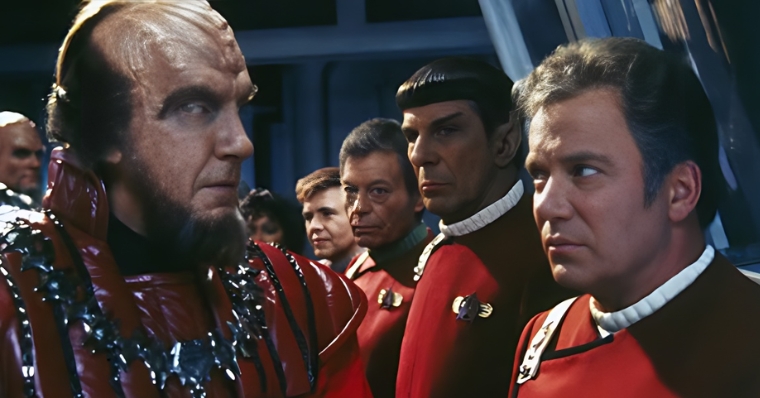
15 - Star Trek VI: The Undiscovered Country (Film)
- Timeline: 2293
- Release Date: 1991
- Where to Watch: Paramount+
In the vast landscape of the Star Trek universe, "Star Trek VI: The Undiscovered Country" holds an irreplaceable spot in the hearts of fans. Why? Because it serves as the swan song for the beloved original crew: Kirk, Spock, Dr. McCoy, Uhura, Scott, Sulu, and Chekov. This is their final curtain call on board the USS Enterprise, setting out for one last adventure that adds more than stardust to their legacies. The stakes? Sky-high, naturally. The Federation is on the cusp of brokering a historic peace treaty with the Klingons. This development could reshape the galaxy's geopolitical (or should we say, "astropolitical") fabric. But as with any diplomatic dance, there are bumps along the way. Kirk and Dr. McCoy find themselves framed for a murder they didn't commit. Wrongfully imprisoned, they must rely on their crewmates, especially the ever-logical Spock, to unravel this galactic whodunnit and keep the peace process on track. You might think this film is just another thrilling romp through space, but it carries the emotional weight of a fond farewell. Watching it, you can't help but feel a sense of poignant nostalgia. The character arcs are meticulously crafted to show how far these icons have come since they first appeared. Their individual journeys are wrapped up in ways that provide satisfying, often touching, closure. As the peace treaty negotiations unfold, underlying themes of prejudice and the fear of change rear their heads, giving the storyline contemporary relevance—even decades after its release. The movie deftly blends political intrigue with high-stakes action, making it more than just a fan service. It becomes a narrative buffet that serves up a little of everything: action, diplomacy, friendship, and more. And that farewell, the final salute to the characters we've watched through countless battles and moral quandaries, truly elevates the film. It becomes more than just another entry in the franchise; it turns into a heartfelt goodbye that leaves you misty-eyed. These characters have journeyed through the far reaches of space and the intricate pathways of our hearts. You'll find it challenging not to get emotionally entangled as you watch the original ensemble take their final bows.
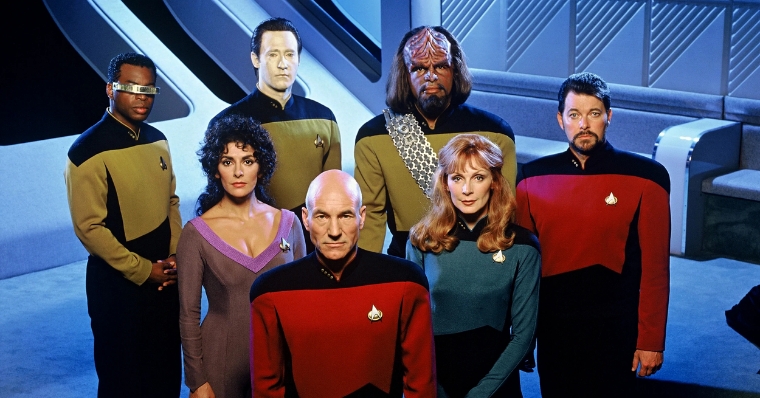
16 - Star Trek: The Next Generation (TV Series)
- Timeline: 2364-2370
- Release Date: 1986–1994
- Number of Seasons: 7
- Where to Watch: Paramount+, SkyGo
Welcome to the rejuvenated universe of "Star Trek: The Next Generation." The name pretty much clues you in—this isn't your granddad's Star Trek. No, this is a souped-up, state-of-the-art USS Enterprise led by a whole new crew that's just as capable, maybe even more so, of exploring strange new worlds, seeking out new life, and, you know, doing all the boldly going things. The indomitable Captain Jean-Luc Picard leads the charge, a role masterfully inhabited by Patrick Stewart. The eloquence, the gravitas—he's got it all. At his right hand is the charismatic First Officer, Commander William T. Riker, given life by Jonathan Frakes. If you think their dynamic duo would be hard to top, you've got another thing coming. The ensemble includes the android Data, intriguingly complex and brought to life by Brent Spiner; Worf, a Klingon security officer with an identity crisis, played by Michael Dorn; Deanna Troi, the empathic counselor portrayed by Marina Sirtis; the motherly yet professional Dr. Beverly Crusher, played by Gates McFadden; and last but not least, the tech-savvy Lieutenant Geordi La Forge, made memorable by LeVar Burton. While the original series and films were classics, let's not pretend they didn't have their limitations. "The Next Generation" ushered Star Trek into a new era and breathed fresh life into its fanbase. By the time this show aired in prime time on mainstream channels, it was like Star Trek had been reborn. It was the '80s, and suddenly, the franchise was no longer solely the province of nostalgic fans. Instead, it became a global phenomenon all over again, capturing the imaginations of countries far and wide. And it wasn't just the new faces or the sleeker starship that made it a hit. The series was a storytelling powerhouse, presenting ethical conundrums and intricate plotlines and introducing us to alien races we hadn't even dreamed of before. Moreover, the show didn't shy away from leveraging new advances in visual effects, making space battles and exotic planets more eye-poppingly real than ever. What's particularly striking is how "The Next Generation" was a torchbearer for change within the Star Trek universe. It toyed with complex narrative arcs, shook up socio-political dynamics in the galaxy, and even redefined the very essence of what it means to be human—or sentient, for that matter. The show was a cauldron of innovation, yet it never lost sight of the human—or alien—element, that core of relatability that makes Star Trek, well, Star Trek. So, if you've somehow missed out on this next-level Star Trek experience, set your phasers to "binge-watch" and prepare to be assimilated—not by the Borg, but by a riveting storyline and characters that will stay with you long after the credits roll.
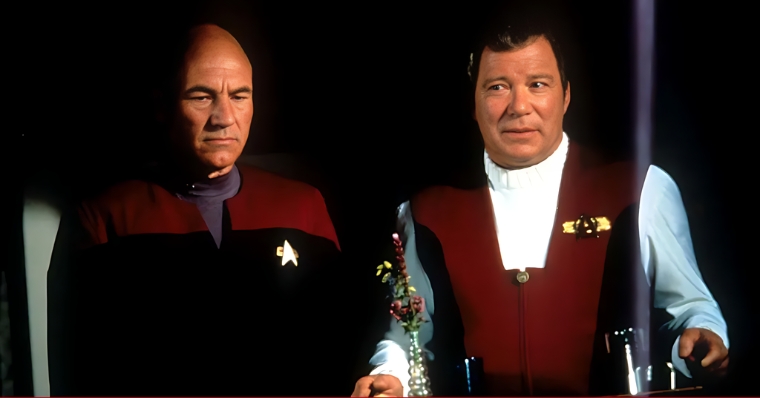
17 - Star Trek: Generations (Film)
- Timeline: 2293 - 2371
- Release Date: 1994
- Where to Watch: Paramount+, SkyGo
In an era where TV shows had a knack for becoming cultural phenomena, the '90s Star Trek series—specifically "Star Trek: Deep Space Nine" and "Star Trek: Voyager"—dominated the airwaves. People were glued to their television sets, consuming episodes like hot, buttered popcorn. Paramount sensed an opportunity to not only capitalize on this small-screen success but to supersize it, transforming a standard meal into a banquet for the senses by jumping to the big screen. The strategy? Instead of launching a fresh crop of space cadets, they opted for a cast reunion that was essentially the television equivalent of an all-star game. Think of it as the Marvel Cinematic Universe before there was one—massive, interconnected, and positively bursting with familiar faces. Cue the entrancing theme music because Captain Jean-Luc Picard, William T. Riker, Data, Worf, Deanna Troi, Dr. Beverly Crusher, and Geordi La Forge were ready for their cinematic close-ups. But here's where Paramount threw a little extra pixie dust into the mix. Sensing that nostalgia can be as potent as Romulan ale, they added a dash of William Shatner as the legendary Captain James T. Kirk. Now, it wasn't just a movie but an event, an extravaganza. Two captains from different timelines and different Star Trek generations sharing the same cosmic stage was the sci-fi rendezvous everyone had secretly hoped for but never dared to vocalize. This wasn't merely a tale of starships and phasers; no, this was a Shakespearean drama set in space. Themes of mortality, time, and the ethics of 'playing God' ricocheted throughout the narrative like so many disruptor beams. The story thrusts our heroes into a vortex of cosmic proportions known as the Nexus—a realm of existence where time and space are mere suggestions, and your wildest fantasies can be indulged without consequence. It's as if they stumbled upon the Bermuda Triangle of the galaxy, with metaphysics on steroids. The characters we've come to love weren't static either. Picard finds himself emotionally unraveling due to a devastating family loss, making him even more relatable, if that's even possible. Meanwhile, Data does something as reckless as it is compelling: he installs an "emotion chip." It's an experience that unfolds like a turbulent blend of comedy and existential crisis—kind of like someone taking their first sip of alcohol and suddenly pondering the meaning of life. And let's not gloss over the action—because, rest assured, this film was no slouch in the heart-pounding department. The space battles are a visual spectacle akin to a cosmic ballet but with laser beams and torpedoes. They encapsulated the serenity and vastness of space and then filled that void with high-octane action sequences. It's the cinematic equivalent of a roller coaster that also somehow manages to make you think deeply about your place in the universe. To top it off, the film gives us this sublime passing-of-the-torch moment between Kirk and Picard that's as iconic as necessary. It's the harmonizing of two eras, an amalgamation of old and new that respects its roots while forging ahead into uncharted territory.
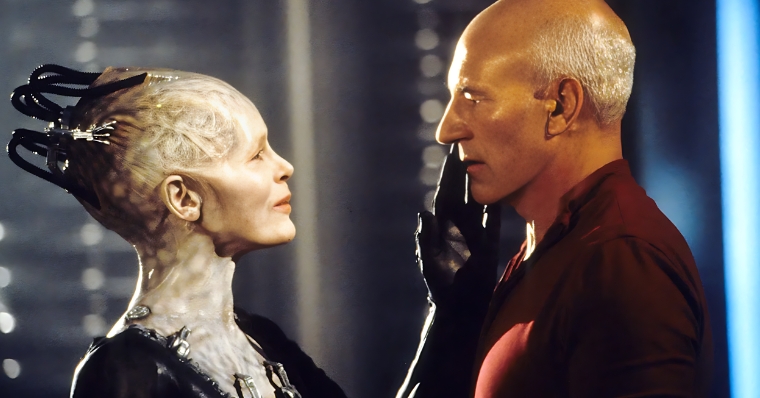
18 - Star Trek: First Contact (Film)
- Timeline: 2373
- Release Date: 1996
- Where to Watch: Paramount+
If you've been tracking the cosmic journey of Captain Picard and the gang aboard the USS Enterprise through the "Star Trek: The Next Generation" series, then you're in luck. The 1996 cinematic gem, "Star Trek: First Contact," is like the ultimate fan thank-you note, but in the form of a blockbuster movie. Now, a heads up for those who haven't dipped their toes into the expansive Star Trek universe: without a basic knowledge of the series, following this movie is akin to trying to navigate through a quantum singularity—tricky at best. The film takes you into a whirlwind adventure where our beloved Enterprise crew squares off against the menacing Borg, an insidious alien race with a penchant for time travel and assimilation. Imagine if time-traveling cybernetic zombies decided to rewrite Earth's history to make it a prime vacation spot for their hive-minded selves. That's what our heroes are up against, and if that doesn't get your pulse racing, check if you're still carbon-based. The special effects? Oh, you're in for a treat. We're talking about state-of-the-art eye candy that was absolutely groundbreaking at the time. It's like they took the visual magic of the TV series and pumped it up with some cinematic steroids. Critics were enamored, to say the least, but the true victory lay in how the film captivated the hearts of the franchise's fan base. Even the die-hard followers of Captain Kirk had to tip their hats to Picard and his increasingly popular crew. What further adds a layer of intrigue to this film is a somewhat unprecedented move: stepping into the director's chair was none other than Jonathan Frakes, who fans will recognize as First Officer Riker. You got it—the studio decided to bring back a tradition where the stars of the Star Trek universe don their directorial caps. The directorial skills of Frakes lend an insider's touch to the film, making the storyline as engaging as a late-night conspiracy theory yet as believable as the laws of physics. There's something profoundly fascinating about an actor who's been part of a series stepping behind the camera; they bring a unique familiarity with the universe that a regular Hollywood director might lack. Consider it the difference between a tourist visiting a city and a local showing you around—each perspective is valuable. Still, the latter has a textured richness that is simply incomparable.
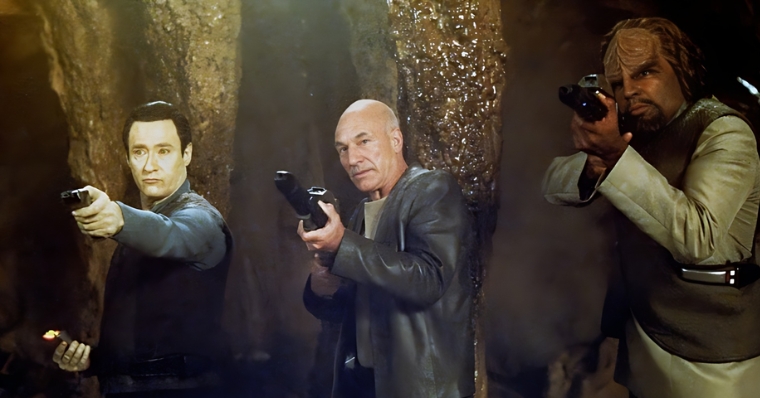
19 - Star Trek: Insurrection (Film)
- Timeline: 2375
- Release Date: 1998
- Where to Watch: Paramount+
Have you ever felt trapped in the tug-of-war between sticking to the rules and listening to your gut? "Star Trek: Insurrection," the third cinematic outing for the "Star Trek: The Next Generation" crew, jumps right into this moral maze. Directed once again by the multifaceted Jonathan Frakes (also your beloved First Officer Riker), the film aims for loftier themes but often finds itself caught in an identity crisis. Sure, this movie shakes hands with familiar names like Captain Jean-Luc Picard, Riker, Data, and the rest of the Starfleet ensemble. Still, they're no longer just explorers but rebels with a cause. The storyline unfolds around the Ba'Ku, an alien race endowed with almost magical longevity thanks to their planet's regenerative properties. Sounds like a utopia. Except there's always a catch. Enter the Son'a, another alien race with plans to exploit this Fountain of Youth-like planet, backed surreptitiously by none other than the Federation. You would think that siding with the Federation would be a no-brainer for Picard and company, right? But what if the Federation's agenda teeters on the edge of the unethical? That's where Picard flips the script, opting to disobey orders to safeguard the Ba'Ku and their idyllic existence. Now, here's where the film trips over its shoelaces. With such a potent storyline, teeming with ethical dilemmas and moral shades of grey, you'd expect "Insurrection" to be a home run. Alas, it barely manages to get past first base. Despite its promising narrative seeds, many viewers have pointed out that it feels more like a stretched-out episode of the TV series rather than a stand-alone cinematic spectacle. The chief complaint? Perhaps it's the absence of that extra sparkle, that unmistakable panache we've come to expect from a Star Trek feature film. It's not that the film lacks action or character depth; instead, it somehow fails to elevate the stakes in a way that resonates on the big screen. It's as if the film decided to take a stroll around the galaxy rather than launch into a warp-drive-paced adventure. The franchise has always prided itself on probing existential questions while weaving them into engaging storylines. "Insurrection" certainly raises the questions but somehow muddles the answers in a tapestry of what could have been. All that being said, the movie isn't without its merits. Stellar performances from Patrick Stewart and the core team offer nostalgic fans a semblance of the magic that made "The Next Generation" series a hit. The CGI and special effects give us enough razzle-dazzle to keep us visually engaged, even if the storyline lacks a crescendo.
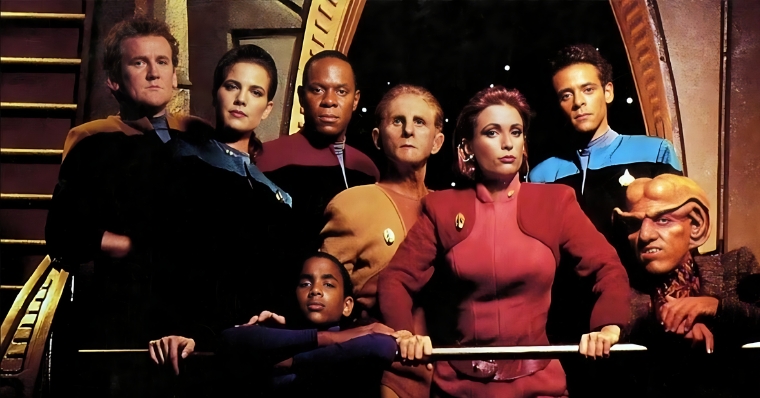
20 - Star Trek: Deep Space Nine (TV Series)
- Timeline: 2369-2375
- Release Date: 1993 – 1999
- Number of Seasons: 7
- Where to Watch: Paramount+
In the ever-expanding universe of Star Trek, the '90s heralded the arrival of a unique jewel in the crown: "Star Trek: Deep Space Nine." Forget everything you thought Star Trek was purely about, like sleek starships and exotic planets. This time, the spotlight shifted to a static setting, an outpost known as Deep Space Nine. It might sound counterintuitive for a franchise that's all about traversing the cosmos, but trust in the vision. This grounded approach revolutionized the Star Trek experience, offering an unprecedented focus on the nitty-gritty of galactic politics, ethics, and, yes, even warfare. Let's be clear—this isn't Star Trek-lite; it's Star Trek in a different tone, a different key. Characters are not just boldly going where no one has gone before; they're living, breathing, and conflicting in a stationary place that has become a crucial chess piece in the geopolitical landscape of the Alpha Quadrant. This setting enabled the creators to dig deeper than ever into the texture of Starfleet and the Federation's ethics, navigating murky waters that a swifter moving vessel like the USS Enterprise could perhaps afford to cruise past. The introduction of fresh characters is another point of intrigue. We meet Commander Benjamin Sisko, an emotionally complex leader portrayed by Avery Brooks, who's tasked with administering this pivotal outpost. Alongside him are various multifaceted characters like the shapeshifter Odo, the Bajoran Major Kira Nerys, and many others, each contributing to a rich tapestry of personalities that explore new emotional depths. In the grand scheme of Star Trek, "Deep Space Nine" may seem like a departure, but it's more like a logical evolution. It's a tale where the mission statement expands from mere exploration to include governance, law, and the messiness of maintaining peace in a galaxy filled with various races, cultures, and ambitions. The format allowed for richer story arcs, providing a more in-depth look at the Federation's complex relationships with powers like the Cardassians and the Dominion. Amid all this, the series didn't drop the ball on tying itself intricately into the broader Star Trek canon. The seven-season saga allowed for a deep dive into the Federation's inner workings and complex alliances, revealing the not-so-glossy sides of Starfleet's mission. The show, therefore, adds layers of sophistication and maturity to the Star Trek brand, enhancing it in ways that are as profound as they are entertaining.
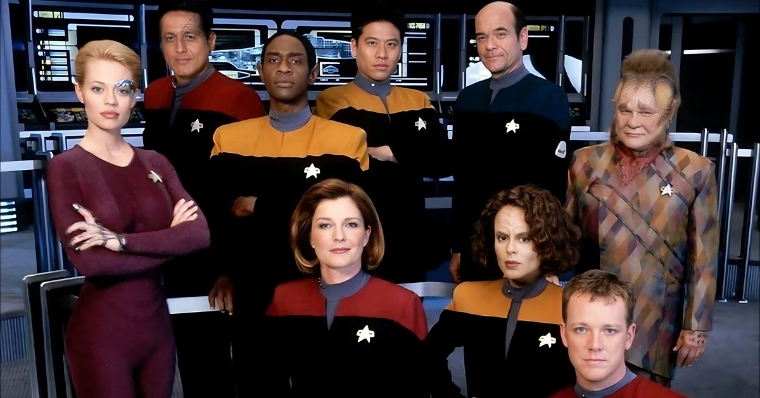
21 - Star Trek: Voyager (TV Series)
- Timeline: 2371-2378
- Release Date: 1995 – 2001
- Number of Seasons: 7
- Where to Watch: Paramount+
There are moments in TV history that defy expectations and change the game, and "Star Trek: Voyager" qualifies as one of those pivotal phenomena. Nestled squarely within the vast Star Trek universe, this show turns heads for a very salient reason—it introduced us to the franchise's first female lead, Captain Kathryn Janeway, years before "Star Trek: Discovery" would tread similar ground. And the woman at the helm? None other than Kate Mulgrew, whose portrayal exudes a blend of command and compassion that serves as a master class in leadership, pleasing fans far and wide. While its predecessor, "Star Trek: Deep Space Nine," delved into the socio-political intricacies of life in one stationary locale, "Voyager" revives the franchise's bread-and-butter: boundless exploration. And here's the kicker: It's not just any exploration. The crew of the USS Voyager is unceremoniously flung into the Delta Quadrant, a far-flung and largely uncharted region of space. Their primary objective? Navigate the treacherous new territory, make some unlikely friends (and foes), and find a way back home. It's like an epic, cosmic road trip, minus the convenience of roadside motels and GPS. The show's creative landscape is as rich as it is daunting. Each episode becomes a discovery odyssey into strange worlds, alien species, and moral quagmires. Think of it as an epic survival tale set against the backdrop of an unforgiving cosmos. You're treated to the growth and evolution of not just Janeway but also her diverse crew members like the half-human, half-Klingon engineer B'Elanna Torres, the holographic Doctor who becomes much more than his programming, and the ex-Borg drone Seven of Nine. Let's not forget the lovably flawed Neelix and the ethically driven First Officer Chakotay. Together, they form a patchwork family in a setting where community and resourcefulness aren't just conveniences but necessities for survival. "Voyager" even extends Star Trek lore, challenging established Federation norms by integrating the crew with Maquis rebels. It's a wild blend of personalities and backgrounds, as Starfleet ideals and Maquis pragmatism frequently clash and collaborate in the high-stakes puzzle of daily existence. This entangled web of relationships, coupled with the ever-looming, complex task of their long journey home, makes every episode feel like a blend of adventure, science fiction, and character drama. And let's cut to the chase: Kate Mulgrew's Janeway is iconic. Her performance adds nuanced layers to the character, culminating in a leadership style that's both hard-nosed and empathetic. Fan reception was through the roof, with many praising how she masterfully navigated the double standards often levied against women in positions of power. She became an inspiring figure not just within the show but in the broader cultural discussion. For those intrigued by the idea of a classic Star Trek premise amped up with fresh twists, "Star Trek: Voyager" is a must-see. Offering both a return to and an expansion of the series' original ethos of exploration, it stands as another jewel in the Star Trek crown.
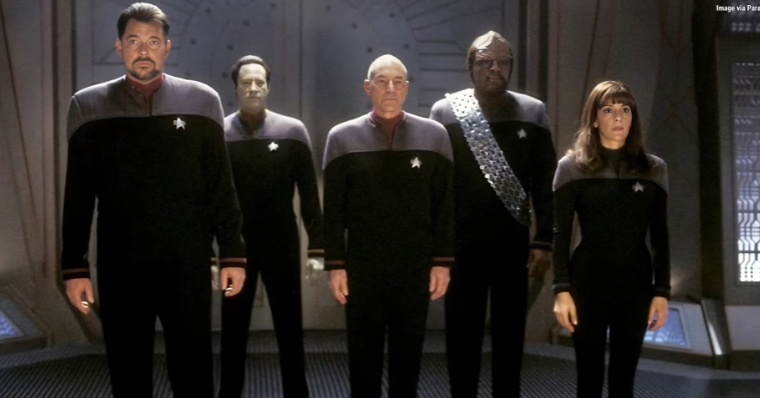
22 - Star Trek: Nemesis (Film)
- Timeline: 2379
- Release Date: 2002
- Where to Watch: Paramount+
If you're a Star Trek fan and think you've seen the franchise at its lowest, perhaps you haven't encountered "Star Trek: Nemesis" yet. Known within the Trekker community as one of the most polarizing entries, it presents a universe that's dipped its toes in murkier waters, taking the usually virtuous Federation and outfitting it with a more militaristic wardrobe. This unsettling shift casts a shadow on the Federation's actions in future storylines, making us question if they've strayed too far from their roots. Now, the icing on this not-so-appetizing cake? The villain, portrayed by Tom Hardy, no less. That's right; before he was fighting off symbiotes or reckoning with his "Inception" dreams, Hardy played Shinzon, a vengeful clone of Captain Picard. Unfortunately, not even his captivating presence could work miracles on a script that was, for lack of a better word, lacking. Add to this the beloved cast of "The Next Generation," and you've got what could only be described as a disappointing stew of missed opportunities. How did it get to this? One wonders if the stars—or starships—were misaligned. The movie's script tries to grapple with themes of identity, revenge, and ethics, but rather than diving deep, it skims the surface, resulting in a narrative as thin as interstellar plasma. It lacks the emotional punch and complexity we've come to expect from a Star Trek film, leaving us pondering what could have been. The visual effects and set designs are certainly polished. The action scenes? They're there but play out like mere window dressing for a plot that lacks focus and direction. It's as if the film wants to be a thrilling space opera but loses its way in the labyrinth of its own aspirations. The upshot? "Star Trek: Nemesis" was such a box office disappointment that it led to a hiatus for the franchise on the big screen, akin to a starship needing years in space dock for a complete overhaul. Now, is it the ultimate downfall of the Star Trek cinematic universe? Probably not. But it definitely nudged the franchise into a reflective hibernation, contemplating its existential purpose. At the same time, the credits rolled, and the audience filed out of the theater, bewildered and slightly saddened.
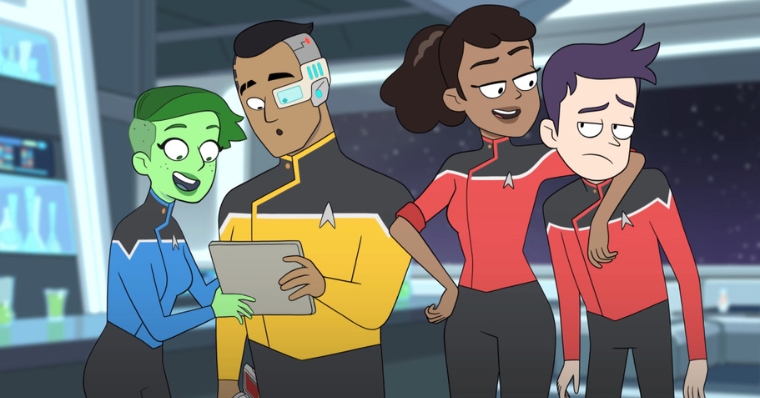
23 - Star Trek: Lower Decks (Series)
- Timeline: 2380-TBD
- Release Date: 2020 – Ongoing
- Number of Seasons: 4
- Where to Watch: Paramount+
In the constellation of Star Trek storytelling, there's a quirky star that shines with a different kind of light: "Star Trek: Lower Decks." It's an animated series that will especially resonate with anyone who's ever gotten a kick out of the bizarre and outlandish world of "Rick and Morty." How could it not? The show's creative juices come from the same minds that brought us those zany adventures. But don't dismiss this as just another spin-off living in the shadows of its predecessors. Oh, not at all. The charm of "Lower Decks" comes from flipping the script—instead of the top brass, we're tagging along with the unsung heroes of starship maintenance. These are the ship's underlings, the crewmen, and women who keep the USS Cerritos from falling apart, and yet rarely get a medal or a poignant monologue. It's a refreshing pivot that sets this series apart from other entries in the Star Trek lexicon. The comedic flair of "Lower Decks" is evident; it's brimming with laughter and absurdity and jam-packed with nods to other Star Trek productions that'll make die-hard fans giddy with recognition. It's as if the series grabbed a fun-sized sampler of everything we love about the franchise and sprinkled in a dash of cosmic humor. And you know what? It's working. The accolades and fan approval are piling up faster than tribbles in a storage compartment. But its importance doesn't stop at chuckles and cosmic inside jokes. This show is doing something more subversive—it's pulling in new audiences. Suddenly, Star Trek is not just for your science-fiction-loving aunt or your buddy who can quote Spock verbatim. It invites the casual viewer, the comedy fan, and even the sci-fi skeptic. Yes, "Lower Decks" is doing for Star Trek what a well-placed photon torpedo does for a tense standoff—it's shaking things up and making you pay attention.
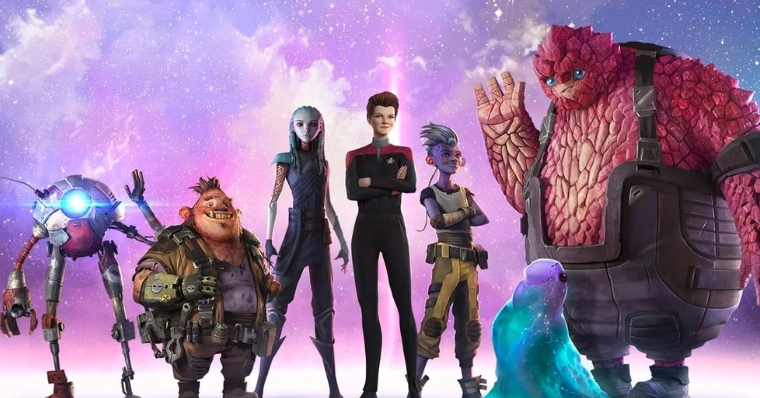
24 - Star Trek: Prodigy (Series)
- Timeline: 2383-TBD
- Release Date: 2021
- Number of Seasons: 1
- Where to Watch: Amazon Prime Video
It was as if someone took a phaser to the Star Trek mold when "Star Trek: Prodigy" rolled onto the scene. What sets this apart? It's the franchise's first-ever 3D animated series, breaking away from the hand-drawn or 2D digital methods of the past. It's unabashedly targeted at the younger crowd—kids, pre-teens, and even the young at heart. The setting kicks off a comfortable five years after the USS Voyager, a ship close to many a Trekkie's heart, successfully navigated its way back to the solace of Earth. In this universe iteration, we sidestep the usual Starfleet cast and instead focus on a motley crew of young aliens. These intergalactic adventurers stumble upon an abandoned Starfleet ship, the USS Protostar. It's sort of like finding a classic Mustang in an old barn, but, you know, with photon torpedoes. Their mission? Navigate the ship through the cosmos and try to reach the much-fabled Starfleet and Alpha Quadrant, all while starting from the distant Delta Quadrant. Here's where it gets especially intriguing for "Voyager" enthusiasts. Kate Mulgrew is back, lending her voice and likeness to the series. But wait, there's a twist: She doesn't just reprise her iconic role as Kathryn Janeway, captain of the USS Voyager. Mulgrew takes it up a notch by serving as an Emergency Training Holographic Advisor. It's basically Janeway in holographic form, crafted to guide and instruct this fledgling crew from the Delta Quadrant. It's a novel way to introduce a cherished character into the series while giving her a distinct role that does more than just pander to nostalgia. Let's not underestimate the significance of this animated venture. "Star Trek: Prodigy" is doing something rather daring—it's bringing the intricate, often dense lore of Star Trek to a younger audience. It's essentially building the bridge to the next generation of Star Trek fans, equipping them with the knowledge and the dreams of space exploration before they even hit high school. Sure, purists might question the show's youthful orientation. Is Star Trek losing its mature, philosophical edge? Not really. "Prodigy" maintains the franchise's integrity, offering ethical quandaries and scientific challenges just like its older counterparts. What it does do, however, is package these elements in a way that's accessible and enthralling to viewers who may be more accustomed to Saturday morning cartoons than debates on the Prime Directive.
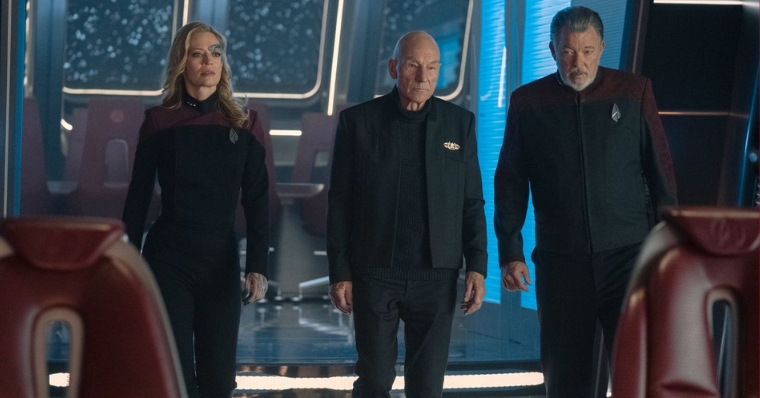
25 - Star Trek: Picard (Series)
- Timeline: 2399-2402
- Release Date: 2020 – 2023
- Number of Seasons: 3
- Where to Watch: Amazon Prime Video, Paramount+
Once the commanding figure leading the USS Enterprise through the gr



























